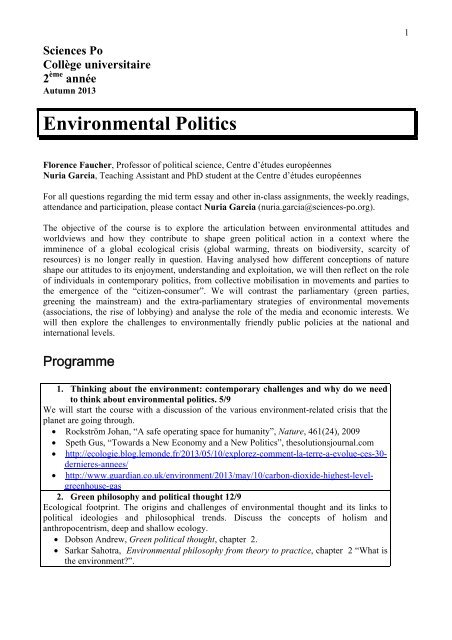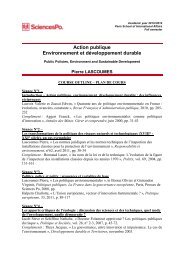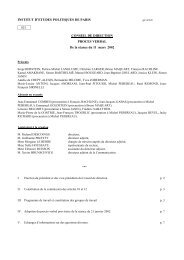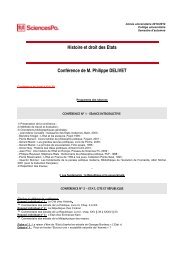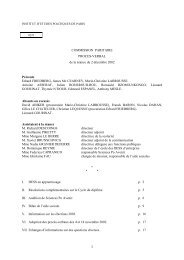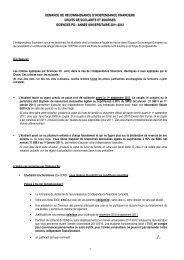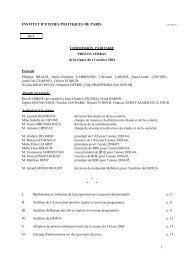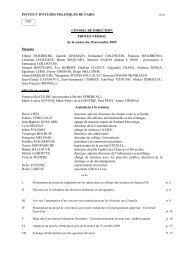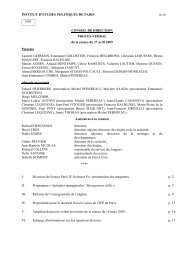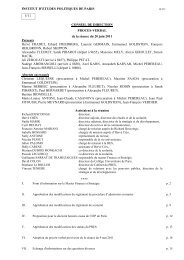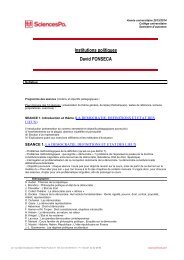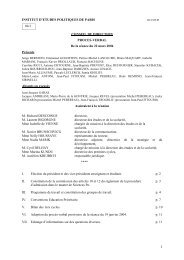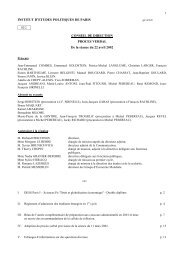Plan de cours - Sciences Po
Plan de cours - Sciences Po
Plan de cours - Sciences Po
You also want an ePaper? Increase the reach of your titles
YUMPU automatically turns print PDFs into web optimized ePapers that Google loves.
<strong>Sciences</strong> <strong>Po</strong><br />
Collège universitaire<br />
2 ème année<br />
Autumn 2013<br />
1<br />
Environmental <strong>Po</strong>litics<br />
Florence Faucher, Professor of political science, Centre d’étu<strong>de</strong>s européennes<br />
Nuria Garcia, Teaching Assistant and PhD stu<strong>de</strong>nt at the Centre d’étu<strong>de</strong>s européennes<br />
For all questions regarding the mid term essay and other in-class assignments, the weekly readings,<br />
attendance and participation, please contact Nuria Garcia (nuria.garcia@sciences-po.org).<br />
The objective of the <strong>cours</strong>e is to explore the articulation between environmental attitu<strong>de</strong>s and<br />
worldviews and how they contribute to shape green political action in a context where the<br />
imminence of a global ecological crisis (global warming, threats on biodiversity, scarcity of<br />
resources) is no longer really in question. Having analysed how different conceptions of nature<br />
shape our attitu<strong>de</strong>s to its enjoyment, un<strong>de</strong>rstanding and exploitation, we will then reflect on the role<br />
of individuals in contemporary politics, from collective mobilisation in movements and parties to<br />
the emergence of the “citizen-consumer”. We will contrast the parliamentary (green parties,<br />
greening the mainstream) and the extra-parliamentary strategies of environmental movements<br />
(associations, the rise of lobbying) and analyse the role of the media and economic interests. We<br />
will then explore the challenges to environmentally friendly public policies at the national and<br />
international levels.<br />
Programme<br />
1. Thinking about the environment: contemporary challenges and why do we need<br />
to think about environmental politics. 5/9<br />
We will start the <strong>cours</strong>e with a discussion of the various environment-related crisis that the<br />
planet are going through.<br />
Rockström Johan, “A safe operating space for humanity”, Nature, 461(24), 2009<br />
Speth Gus, “Towards a New Economy and a New <strong>Po</strong>litics”, thesolutionsjournal.com<br />
http://ecologie.blog.lemon<strong>de</strong>.fr/2013/05/10/explorez-comment-la-terre-a-evolue-ces-30-<br />
<strong>de</strong>rnieres-annees/<br />
http://www.guardian.co.uk/environment/2013/may/10/carbon-dioxi<strong>de</strong>-highest-levelgreenhouse-gas<br />
2. Green philosophy and political thought 12/9<br />
<br />
Ecological footprint. The origins and challenges of environmental thought and its links to<br />
political i<strong>de</strong>ologies and philosophical trends. Discuss the concepts of holism and<br />
anthropocentrism, <strong>de</strong>ep and shallow ecology.<br />
Dobson Andrew, Green political thought, chapter 2.<br />
Sarkar Sahotra, Environmental philosophy from theory to practice, chapter 2 “What is<br />
the environment”.
2<br />
3. The challenges of collective action 19/9<br />
Mobilising for the environment suffers from classic problems of collective action. We will<br />
discuss theories of collective action and mobilisation.<br />
Hardin Garrett Tragedy of the Commons, ”, in Ken Conca and Geoffrey Dabelko (eds),<br />
Green <strong>Plan</strong>et Blues. Environmental <strong>Po</strong>litics from Stockholm to Kyoto, Westview, pp 40-<br />
48.<br />
James Connelly and Graham Smith, <strong>Po</strong>litics and the Environment, Routledge, chapter 4<br />
4. Individualized collective actions 26/9<br />
Training on bibliographical research with a Eva Arfwedson from the <strong>Sciences</strong> <strong>Po</strong> library.<br />
Discussion of the role that individuals may play or want to play: individual responsibilities<br />
and barriers to action. We will focus on consumption as cause and solution of the current<br />
environmental crisis.<br />
Durning Alan (1998), “How much is enough”, in Ken Conca and Geoffrey Dabelko<br />
(eds), Green <strong>Plan</strong>et Blues. Environmental <strong>Po</strong>litics from Stockholm to Kyoto, Westview,<br />
pp 273-278<br />
Maniates Michael F. (2002), “Individualization: <strong>Plan</strong>t a Tree, Buy a Bike, Save the<br />
World”, in Princen Thomas, Michael F. Maniates and Ken Conca (2002), Confronting<br />
Consumption, MIT Press, pp. 43-66 and the Lorax by Dr Seuss<br />
5. The environmental movement 3/10<br />
In this session we will look at the environmental movement and its history.<br />
Philip W.Sutton (2004), Nature, Environment and Society, Palgrave, chapter 2.<br />
MacDonald Christine (2010), “The New Environmental Activists”, emagazine.com<br />
6. Green parties 10 /10<br />
Green parties have emerged in the 1970s and have played a role in bringing environmental<br />
issues to the fore of the political agenda. We will look at the specificities of organisations that<br />
initially started as challenges to traditional party organisations and consi<strong>de</strong>r how they have<br />
been transformed by their electoral successes.<br />
Dolezal, Martin. 2010. « Exploring the Stabilization of a <strong>Po</strong>litical Force: The Social and<br />
Attitudinal Basis of Green Parties in the Age of Globalization ». West European <strong>Po</strong>litics<br />
33 (3): 534‐552.<br />
Rihoux Benoit, Wolfgang Rudig (2006), “Analyzing the Greens in <strong>Po</strong>wer: Setting the<br />
agenda”, EJPR, 45, pp S1-33.<br />
7. Greening the mainstream with Simon Persico (Centre d’étu<strong>de</strong>s européennes)<br />
17/10<br />
In this session we will discuss how mainstream parties have respon<strong>de</strong>d to the challenges of<br />
environmental politics, focusing in particular on their policies.<br />
Dunlap Riley and Aaron McCright (2008), “ Wi<strong>de</strong>ning gap: Republican and Democratic<br />
views on climate change”, environmentmagazine.org.<br />
Carter Neil (2006), “Party <strong>Po</strong>liticization Of The Environment In Britain”, Party <strong>Po</strong>litics,<br />
12, 747-67.<br />
8. Corporate environmental responsibility 24 /10<br />
The session will consi<strong>de</strong>r how the capitalist system is responding to the critique of the<br />
environmental movement and adapting to the challenges it may pause.<br />
Cox Robert (2006), “Green Marketing and Corporate Campaigns”, Environmental<br />
Communication and the public Sphere, Sage, pp. 367-409.<br />
Vogel, David (2005), “Corporate responsibility for the environment”, in The market<br />
for Virtue. The potential and limits of corporate social responsibility, Brookings.
3<br />
9. The environment as a policy issue 7 /11<br />
This session will offer an opportunity to reflect on what makes environmental issues<br />
challenging for politics-as-usual and the principles that have to be introduced when <strong>de</strong>aling<br />
with potential irreversible and catastrophic changes.<br />
Whitesi<strong>de</strong> Kerry (2006), Precautionary <strong>Po</strong>litics. Principle and Practice in confronting<br />
<br />
environmental risk, MIT, pp. 61-88.<br />
Whitesi<strong>de</strong>, Boy, Bourg (2010), “France Grenelle <strong>de</strong> l’environnement: openings and<br />
closures in ecological <strong>de</strong>mocracy”, Environmental <strong>Po</strong>litics, 19(3).<br />
10. Q and A and Brainstorming session 21/11<br />
DEADLINE for Critical Reviews.<br />
11. Class test 28/11<br />
12. Concluding session on the environment in international negotiations 5/12<br />
This session will analyse international agreements and negotiations relative to the<br />
environmental crisis.<br />
<br />
<br />
Screu<strong>de</strong>r Yda (2009) “from Rio and Kyoto to beyond” in The Corporate<br />
Greenhouse, Zedbooks.<br />
Dimitrov Radoslv (2010)« Insi<strong>de</strong> UN Climate Change Negotiations: The<br />
Copenhagen Conference », Review of <strong>Po</strong>licy Research, 27 (6), pp.795-821.<br />
Assessment<br />
Critical review 30% essay 30% test 30% participation 10%<br />
1. Critical review<br />
Write a critical review of Gustav Speth, The Bridge at the Edge of the World: Capitalism, the<br />
Environment, and Crossing from Crisis to Sustainability, Yale University Press, 2008.<br />
1000 word (+/-10%). Provi<strong>de</strong> word count. NO FANCY OR COLOURFUL COVER/FRONT<br />
PAGE. <strong>Po</strong>lice 12, justified and single spaced (margin 3 cm on the left, 2 otherwise). If you submit<br />
an electronic copy (as well), it must be a Microsoft Word document.<br />
2. Essay<br />
Choose ONE essay question out of the following:<br />
1. To what extent is “the tragedy of the Commons” restricting options<br />
when <strong>de</strong>aling with a global ecological crisis<br />
2. Take note of everything you eat during one full week. Write an essay<br />
reflecting on where you food comes from, how it is produced and<br />
what it means in terms of sustainability.<br />
3. Are green parties the best way to promote the environment on the<br />
political agenda<br />
Submit a paper copy to both professor and teaching assistant by 17 October (beginning of the<br />
class session).<br />
Penalty 2 points per 24 hours.<br />
<br />
<br />
2500 words (-+ 10%) - Provi<strong>de</strong> word count.<br />
<strong>Po</strong>lice 12, justified and single spaced. NO FANCY OR COLOURFUL COVER/FRONT<br />
PAGE. The bibliography must follow the text immediately.
You can also submit an electronic copy. It must be in Microsoft Word and a SINGLE<br />
document– the bibliography MUST be inclu<strong>de</strong>d in the document. No separate file for the<br />
bibliography. The title of the file must be your name and title of <strong>cours</strong>e.<br />
Bibliography/references:<br />
A minimum of 5 aca<strong>de</strong>mic sources not inclu<strong>de</strong>d in the <strong>cours</strong>e syllabus is required (peerreviewed<br />
journals, aca<strong>de</strong>mic publishers). There is no limit on the number of non aca<strong>de</strong>mic<br />
references (press, think tanks, specialist websites such as European Union policy briefings,<br />
governmental whitepapers, etc.) you can use.<br />
You are encouraged to conduct a bibliographic search. A good place to start is the <strong>Sciences</strong> <strong>Po</strong><br />
Library catalogue. A session with a librarian at the beginning of the semester can be organised<br />
upon request.<br />
You are invited to use the Harvard style for quoting sources. Check online for<br />
innumerable explanations of how to use it if in doubt.<br />
Note that plagiarism is not acceptable and that <strong>Sciences</strong> <strong>Po</strong> uses URKUND to check for<br />
such occurrences.<br />
3. Class test<br />
There will be a 2 hour test, in class on 28 November.<br />
4. Class contributions.<br />
All classes are compulsory in <strong>Sciences</strong> <strong>Po</strong> and there is a roll call every time. You are responsible for<br />
making sure that you have been noted present.<br />
You are expected not only to be physically present but also to take an active role in discussions and<br />
assignments. Computers and other electronic <strong>de</strong>vices are not allowed in the seminar. I am tired of<br />
stu<strong>de</strong>nts being physically present but very visibly absorbed in the virtual world.<br />
Come prepared for each session, having read the required material. There will be short<br />
unannounced quizzes during the semester.<br />
4


